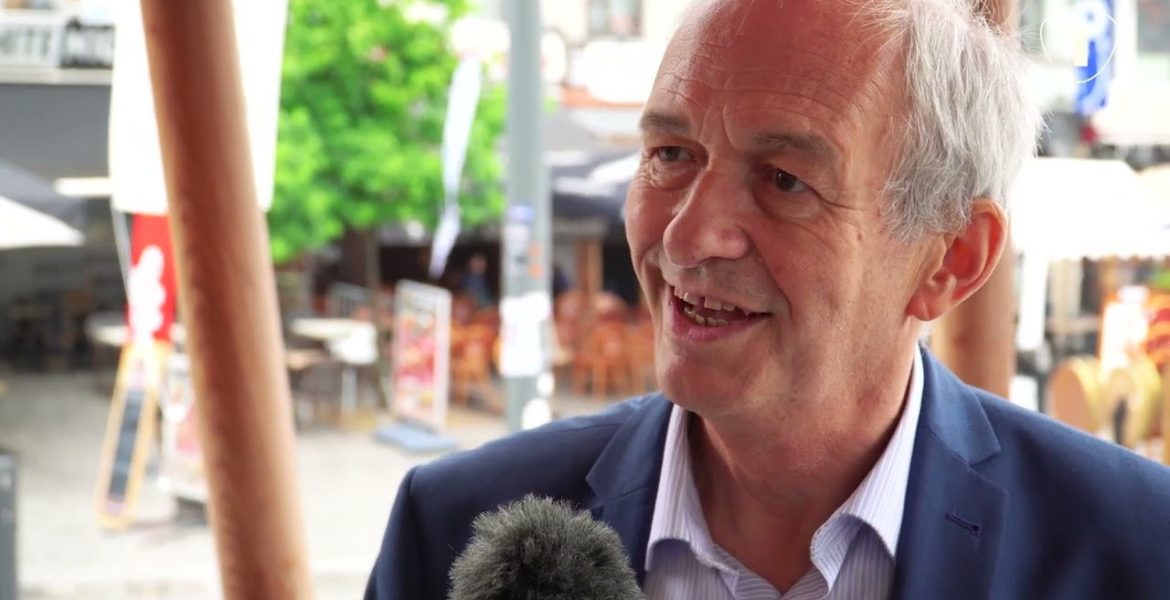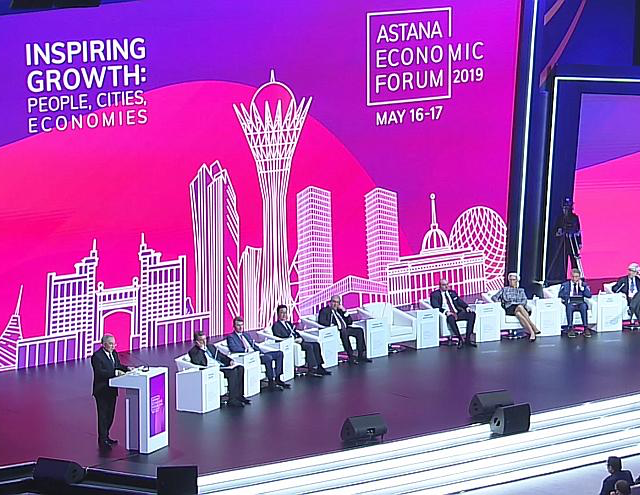Richard Corbett, former leader of the European parliamentary Labour party, says a “clearer” Remain position could have resulted in the UK not voting to leave the EU.
The former long serving MEP and close aide to ex European council president Herman Van Rompuy also admitted it was “very painful” to see the UK leave the EU.
His comments come in an interview with the group “UK in a Changing Europe” (UKICE).
Below is the interview in full:
UKICE: What was your reading of the December 2019 General Election? Did Labour lose because it failed to back Brexit and instead called for a new referendum?
Richard Corbett: The idea that Labour would have done better had it supported the Tory Brexit deal and not offered the public a say on the final outcome is wrong.
Almost every opinion poll in 2019 showed a majority would vote to Remain in a new referendum. And in the general election, some 53% voted for parties demanding a new referendum – so it was far from being an unpopular position. Johnson, meanwhile, got 43% for the Conservatives – only 1% more than Theresa May did in 2017. He won his majority of seats because of the way the votes split among the parties, not because of any Brexit-supporting surge.
Where Labour fell short on the Brexit front (which was not the only issue, of course, but a major one) was on the perceived ambiguity about its position, which caused Labour to lose voters to other Remainer parties – not as much as in the European Parliament election, but enough to cost us dozens of seats in this one.
This was because the party position was indeed to have another referendum, but with a complicated caveat, namely to say, ‘We’ll first negotiate to get a better deal and then put that to the public to choose between that better deal or Remain’.
This perhaps had a certain logic in that, as one of the options in a new referendum is to Leave, then it would be good to have a less damaging deal than the Conservative deal we were so critical of. But frankly, it was too complicated a position to easily explain, and it was vulnerable to attack as being ambiguous – might a Labour government getting a better deal decide to back Brexit on those terms? And some in the Labour Party, including party chair and campaign manager Ian Lavery, wanted to talk up that ambiguity to placate Leave voters.
But I was at the Labour Party NEC meeting after the general election that pored over the results. It was clear that we had again lost more voters to parties with a clearer Remain position. The Lib Dems and the Greens went up by over five per cent – far more than the Tory rise of 1 per cent – mostly at Labour’s expense, as they attacked us for being too weak in opposing Brexit.
A clearer Remain position, properly and articulately advocated and explained by the leadership, would have secured a better result. Even in the so-called ‘red wall’, there were a dozen seats that were lost by Labour to the Tories by a smaller margin than the number of previous Labour voters who switched to the Lib Dems and the Greens. Labour would have done better to keep those votes and work harder at persuading the Leavers. Had we made the case week in, week out, instead of hiding from it or mouthing that we’d take a final position after the election once we’d got a new deal, the number of Labour Leavers would have shrunk and we would also have retained more Remainers. Instead, in a forlorn attempt to placate Leavers, we lost far more Remainers.
You still hear facile stereotypes that are bandied about, such as the claim that working class voters were overwhelmingly pro-Brexit or that it is a north-south division. In the 2016 referendum, most working-class people in work voted Remain, while most working-class voters not in work, mostly retired, voted Leave – a more subtle division than portrayed. And as for the north, it had much the same division between cities and small towns as the south – Liverpool, Manchester, Leeds, York, Newcastle all voted Remain, and the most northern part of the UK – Scotland, where a Labour desperately needs a comeback – was overwhelmingly Remain.
Offering a second referendum was not simply an electoral tactic, it was the right thing to do. Faced not just with Brexit, but a particularly damaging deal, Labour was right to insist that something so different from what was promised should go back to the people to be endorsed or rejected, even Labour had formed a government and been able to attenuate it. To have backed away from offering a public vote would have been plain wrong and made Labour look unprincipled.
UKICE: What was it like going back into the European Parliament when you were not sure how long you would be there? Particularly with the big contingent of Brexit Party MEPs there. What was that period like?
Corbett: It was in many senses strange. But we were of course pleased to be back. We were there with a new lease of life, which we knew might be short but was better than nothing. And we were fighting for it to be longer.
As I said, on our side of the house we were well treated by our colleagues, who showed they had considerable respect for us.
UKICE: What was it like when you finally realised that time was up, and the UK was going to leave the European institutions on 31 January 2020? Was saying goodbye and disbanding your office a painful process?
Corbett: Yes, it was very painful. During the last session in January 2020, we were at a Parliament sitting in Brussels and there were a number of goodbye events. We weren’t the only ones in tears. A lot of our colleagues, whom we had been working with for many years, were very unhappy. It was a very emotional week.
Within the Parliament itself, there was a question of what, immediately after that vote, to do to mark the occasion? Should we have some speeches? Bearing in mind that Farage and his lot were likely to be cheering and making a noise.
I think it was the German Green MEP Terry Reintke who came up with the idea that the Parliament should rise and sing Auld Lang Syne, the French version being of course being ‘ce n’est q’un au revoir’. That was agreed among the political groups and by EP President David Sassoli, who sadly died earlier this year, who acquiesced that the Parliament would do that.
That worked quite nicely, because it showed everybody standing together, linking arms, in a really heartfelt moment. It drowned out the cheers of the Brexit Party mob. My colleague Rory Palmer, Labour MEP for the East Midlands, had come up with this idea of making scarves saying “Forever United” with the Union Jack at one end and the European Union flag at the other, that many MEPs wore. It was a very moving moment.
UKICE: What do you think about prospects for future engagement, maybe with a Labour Government, maybe through the Parliamentary Partnership Assembly? Do you think there is a basis for positive co-operation between the UK Parliament and the EP in the future?
Corbett: Well possibly. Firstly, on that Assembly, we’ll see what its members want to use it for. Some – and I note for example that Dan Hannan is on it – will want to use it as a forum to pursue conflicts. Not necessarily conflicts with the EU, but British party conflicts, because every time others on the UK side say, ‘It would be a good idea if the UK re-joins Erasmus’, or something similar, they’ll go to the media and say, ‘Ah see, they are trying to sabotage Brexit. They are in cahoots with the EU’. If that’s what they want to do, then it’s not going to be a very fruitful body. But otherwise in general I think it’s very good to have re-established contacts.
Much depends on what happens in the wider debate in Britain. Remember what I said earlier about public opinion not rallying behind the referendum result? The same seems to be happening now that we’ve actually left the EU. You’d expect public opinion to say, ‘That’s settled. We move on.’ which is what most politicians are saying, but some opinion polls still indicate a lot of opposition to it. Even ‘Re-join’ had a majority in one of those polls recently.
If public opinion continues to be sceptical about Brexit, that makes it easier for a future government to say, ‘At the very least we should reverse some of the more damaging things. Can’t we make a deal to stay in Europol or in Erasmus? Could we have greater participation in the Single Market?’
Given the demographics of attitudes towards Europe in terms of age, and the continued drip drip drip drip of visible problems, from lorries queuing at Dover to extra costs and inconveniences, opinion could well harden. And who knows? British opinion has sometimes swung completely against something it initially backed. Think of Suez. Think of Iraq more recently. Think of the Munich Agreement historically. Nobody defends these things these days.
If Brexit comes to be widely seen as a national error, and if that becomes the received wisdom of 60% or more of the public, then that will make it easier for a future government to at the very least try and rebuild some sort of closer relationship with the EU and maybe even open the question of re-joining. Already now, the European Movement is campaigning for it and seeing a huge growth in its membership.
UKICE: Based on your knowledge of your European counterparts do you think they would be up for the UK re-joining? Or would they only be in favour once we’ve been through rather a long period and have an overwhelming majority of the population seeing this as a mistake?
Corbett: They would love to see us re-join, as long as it doesn’t mean going through this whole saga again. They’d want to be reassured that the change of heart was not likely to be reversed once again a few years later. But in general, yes, they would.
It wasn’t a good thing for the EU to lose a member state for the first time in its history, particularly a significant one. Brexit is an economic cost to the EU as well, not just to Britain. If you look at a map of Europe, not having Britain is a big gap, not just in terms of maps but also politically. With France and Germany, Britain was in many ways part of a balanced tripod. In the eyes of many of the smaller member states, having one leg of that tripod removed means that there is a fear of domination by Germany, or Germany and France together, that wasn’t there before.
UKICE: Do you think that in the EU there was too many people who thought that the UK would think twice, particularly if the EU took a hard line, and that meant that the EU didn’t actually think about what a good, strategic, long-term relationship with a non-member UK would look like? Do you think the EU thought enough about the repercussions of a major member state deciding to give up the benefits of membership?
Corbett: It was a shock to the EU that a country wanted to leave. The fact that it was Britain perhaps lessened that shock, because Britain was sometimes seen by some of them as a half-hearted member anyway. But the fear of it triggering similar Exits, as Farage boasted it would, has receded. The various Eurosceptic parties in France, Denmark, the Netherlands and elsewhere saw what happened to Britain after Brexit and moderated their position. Most of them are no longer asking for their own country to leave the EU. Seeing the upheavals, the complications and the complexity of that course of action has not encouraged others to follow it.
In terms of reflecting on what sort of relationship to build with Britain as a non-member, they see this as depending on Britain. Their door is open to British participation in research programmes, Erasmus, space cooperation, technical agencies and police cooperation. They would be prepared to make deals to facilitate market access. They want a close strategic relationship. But on all these things and more, they currently see a British government that seems to actively want to sever ties of all kinds.




